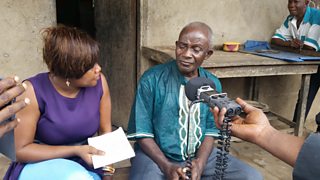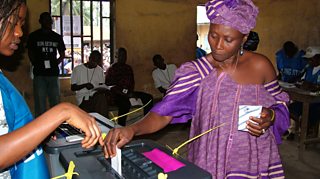Information you can trust: Tackling misinformation ahead of Sierra Leone鈥檚 elections
Marian Tina Conteh, Arnold Felix-Elba, Larry Tucker
六合开奖记录 Media Action Sierra Leone
Tagged with:
Sierra Leone is preparing for a general election for a new president and parliament. We’ve been working with our local media partners to support them to identify and debunk false and misinformation, and to strengthen their coverage, including through the iVerify platform. 六合开奖记录 Media Action’s mentor-trainers Marian Tina Conteh and Arnold Felix-Elba, and social media producer Larry Tucker, sat down with our head of communications, Carolynne Wheeler, to explain.
Marian, Arnold and Larry, thanks so much for joining me! The national elections in Sierra Leone are fast approaching - with 13 candidates for president alone, an increased security presence, a ban on political street rallies, and a sea of misinformation swirling ahead of the vote. What are the challenges faced by our media partners in this environment?
Marian Tina Conteh: I think the biggest challenge is that there is already a lot of mis- and disinformation, online and in traditional media. Although social media, blogs and influencers are emerging, there is still a strong reliance on radio and television. And journalists need the skills to identify and tackle false information. It can be hard for them to cross-check and confirm information so that the public has credible information around the elections.
Arnold Felix-Elba: Journalists are currently facing a lot of challenges. A journalist from the southern part of the country was attacked, almost beaten into a coma, for just doing his job. So covering stories can be quite demanding if you're a journalist that stands for the truth. And it is becoming harder to get to the truth – everyone, including political parties and their proxies, is spreading misinformation.
This sounds like a very difficult situation. All of our media partners are facing financial challenges, political pressure and lots of misinformation. How do we support our media partners and their journalists in this environment?
Arnold Felix-Elba: Training is key. We have three areas of work: We have trained fact-checkers to run the iVerify platform, a UNDP-created platform run by members of the Sierra Leone Association of Journalists and the Independent Radio Network, which helps separate truth from fiction. We have been running training sessions around the country, providing local journalists and social media influencers with the skills to help them understand the tactics, motivations behind information disorder, and how to detect and debunk it – as well as issues of safety and security for those covering elections. And we are also running training sessions for marginalised groups who are often left out of discussions around misinformation and media literacy – to ensure they understand how to detect false and misleading information, and what to do if they come across it.
Can you tell me a bit more about the iVerify platform, which is run by local journalists to address some of the misinformation that has been circulating? It’s addressed more than 40 rumours and false stories so far!
Marian Tina Conteh: We have been providing the training for the factcheckers who run the platform. It is operated as a local initiative; we do not own or run it ourselves. But it is making a huge impact with journalists and audiences. Now, when people come across some new information they’ll often ask if it should be fact-checked. And yes, they need to, especially if they think the information is not correct or if you’re not sure.
Arnold: To give you an example, there’s a popular social media commentator who put out a claim that parliament had closed and that the sitting president was no longer president. This was widely circulated online, but the information was completely false - because the constitution doesn't say that. The iVerify platform was able to demonstrate that claim was completely false and misleading.

Could you tell me more about the training we have been working on?
Arnold: Our job has been to train journalists, social media influencers and bloggers on mis- and disinformation and in media literacy. That’s what we’re focused on.
And we’ve had some wonderful testimonies about the value of our work. In one session, we discussed how promoting false information could even destabilise the democracy of Sierra Leone.
Marian: We did several sets of training, right across the country. We identified some of the main blogs in the country, and trained bloggers as well as journalists from our partner radio stations. We’re also preparing training for people living with disabilities and youth groups, because we know they often don’t get any media literacy training. Surveys often show that young people are perpetrators of misinformation.
We’ve also seen fewer female journalists taking part in the training. So we’re planning to arrange more training focused on them, for both traditional and digital media.
The reactions have been really encouraging. Our participants say they now understand much more about the responsible use of social media, and some of the journalists have organised programmes and social media campaigns about media literacy and the danger of false and misleading information for their audiences. One blogger told us, “I thought I knew a lot in this field, but the training convinced me that I did not. I can now identify untrue news stories or fake news.”
Another blogger called the training “an exciting learning experience”.
“Survival is critical for a young guy like me, and to tell the truth, we receive huge money from politicians to spread mis/disinformation. Before this training, I did not know the impact of my actions, but from now on, I will be mindful of what I post and share online.”

File image from a Sierra Leone election
Larry, can you tell us about the work we’ve been doing on social media to support this training?
Larry Tucker: During elections, people use Facebook as the main platform and it’s the place where the political parties propagate their propaganda. People then post and share incorrect information. So we’re working to help audiences understand how to use Facebook properly, how to protect themselves online and know what misinformation is.
We want people to understand how they can verify what they see online so they don’t fall victim to propagating propaganda messages. We've done a series of public service announcements with local comedians. These are interesting, entertaining, and give a clear message. They’ve performed very well on our
With less than two weeks left in the campaign, what is next?
Arnold: Because we are partners with Sierra Leone’s Independent Radio Network, we’ve been helping them form ideas for their 30-minute programmes that talk about mis- and disinformation. And as part of our training, we’ll continue to give support in producing their shows.
六合开奖记录 Media Action Sierra Leone can be found on Facebook @bbcmediaactionLS and on Twitter @bbcmasl. Read more about our work in the country on our and learn more about in Sierra Leone.
